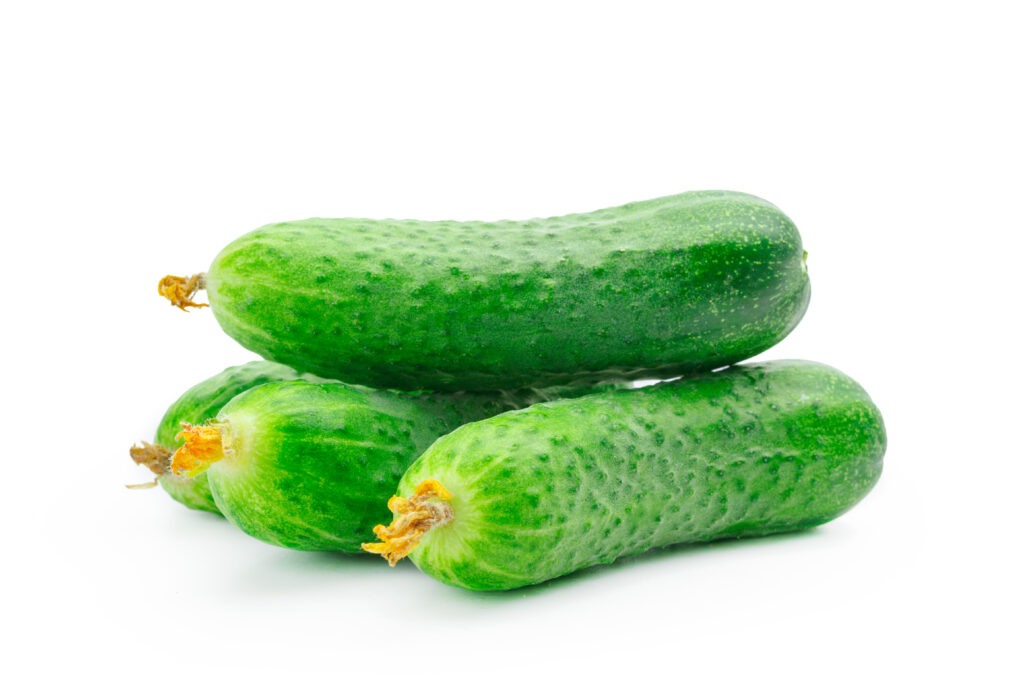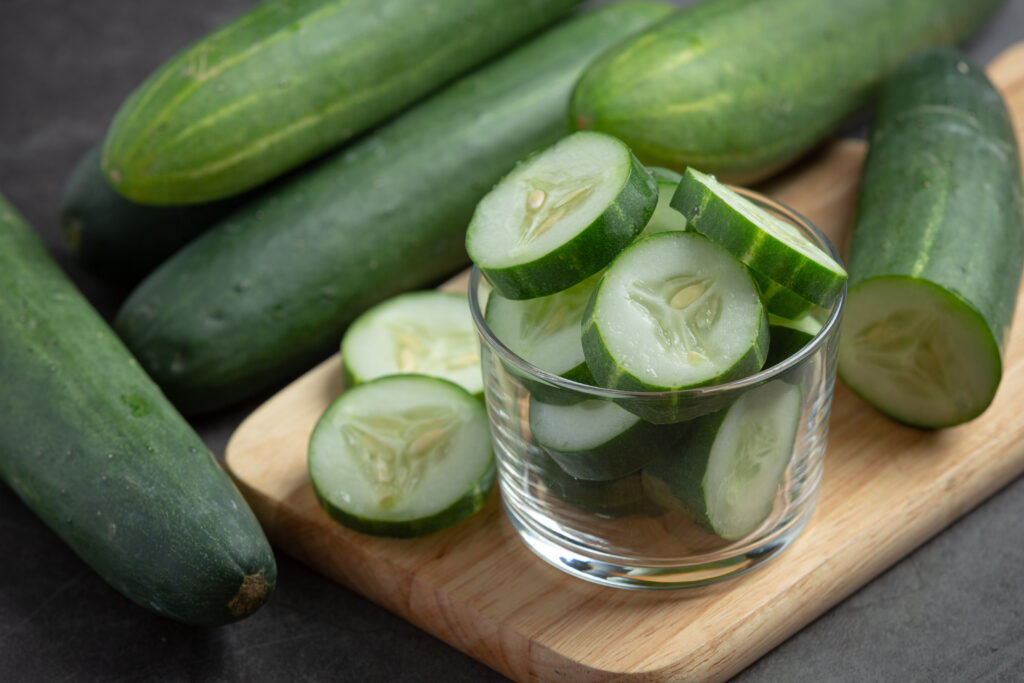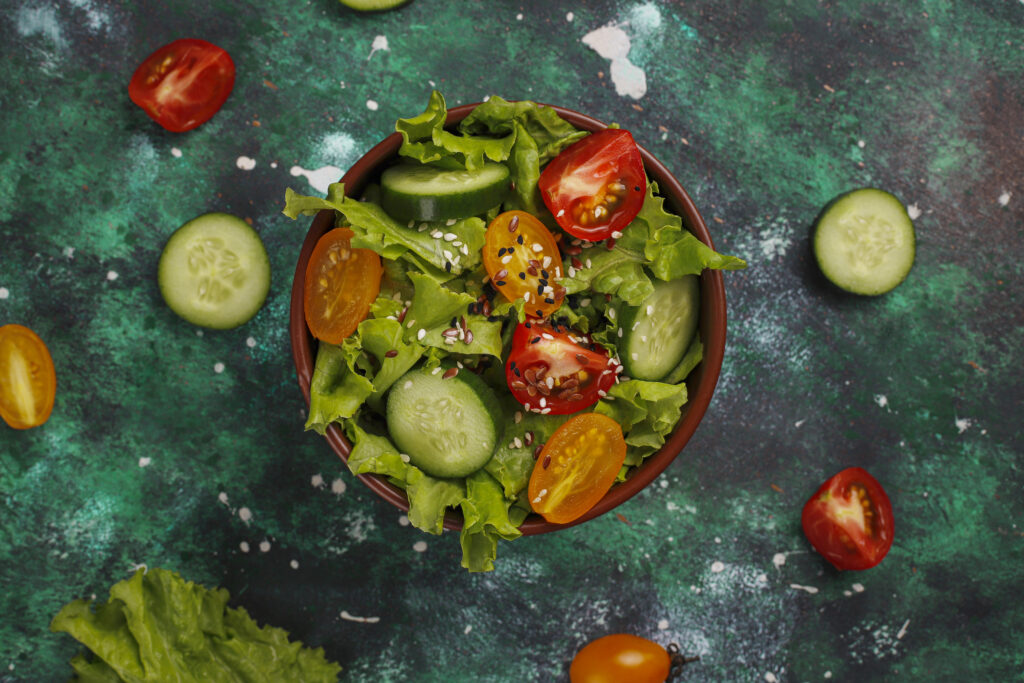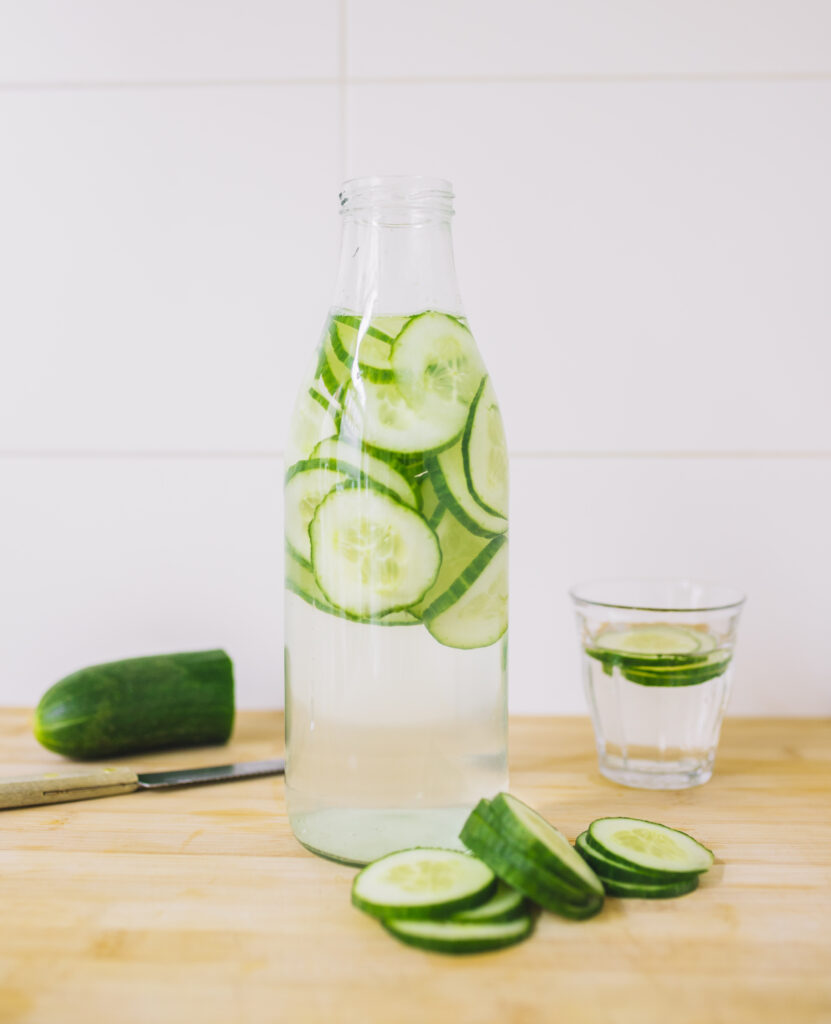what is cucumber?
Cucumber is a widely grown plant in the gourd family Cucurbitaceae. It is grown mainly for its edible fruit, also known as cucumber. Cucumbers are usually eaten raw, either cut into pieces or in salads, but they can also be pickled and eaten or used in various dishes and drinks. They are known for their crisp texture and mild, refreshing flavor. Cucumbers are rich in water and low in calories, making them a popular choice for people who want to stay hydrated or add some crunch to their meals.

what are the types of cucumber?
Slicing Cucumbers: These are the most common type of cucumbers found in grocery stores. They are generally large with dark green skin and firm flesh. Cucumbers are often sliced and eaten fresh in salads or sandwiches.
Cucumber Pickles: These cucumbers are small and have bumpy skin. They are commonly used for making pickles due to their crisp texture
English or European cucumbers: These cucumbers are longer and thinner than cut cucumbers, have smoother skin and fewer seeds. They are often wrapped in plastic to protect their delicate skin. English cucumbers are prized for their mild flavor and are commonly used in salads and sandwiches and ability to absorb flavor from the pickle solution.
Persian or Lebanese cucumbers: Similar to English cucumbers, Persian cucumbers are small and seedless. They have thin skin that doesn’t require peeling, making them convenient for snacking or adding to salads.
Cucumber: Cucumbers are small cucumbers, often no more than a few inches long. They are commonly used for making pickles and have a crisp texture and a tangy flavour.
Armenian Cucumbers: Also known as snake cucumbers, these cucumbers are long and thin with light green skin. They have a mild flavor and are often eaten fresh or used in salads.
why some times cucumber's taste like bitter?
.The bitter taste in cucumbers can be caused by several factors.
Variety: Some varieties of cucumber have a naturally slightly bitter taste. This bitterness can vary depending on the specific variety and growing conditions.
Growing Conditions: Environmental factors such as temperature, sunlight, soil composition, and water availability can affect the flavor of cucumbers. Stressful conditions, such as uneven watering or extreme temperatures, can cause cucumbers to taste bitter.
Overripe cucumbers: Cucumbers that are left on the vine for too long can become overripe, causing them to taste bitter. It is best to harvest cucumbers when they are still firm and have a uniform color.
Bitter compounds: Cucumbers contain natural compounds called cucurbitacins, which can cause bitterness. These compounds are typically found in high concentrations in the skin and stems of cucumbers. Stressful growing conditions or genetic factors can increase the production of cucurbitacin, causing the taste to become more bitter.
Cross-pollination: Cross-pollination with other plants in the pumpkin family, such as bitter gourd or wild cucumbers, can result in bitter-tasting cucumbers.

can we eat cucumber with peel or without peel?
Yes, you can eat cucumbers with or without the peel, depending on your preference and how you plan to use them.
Eating cucumber with peel: The peel of the cucumber is edible and contains many nutrients including fiber and vitamins. Eating the cucumber with the peel on can provide additional texture and flavor. If the cucumber is organically grown or washed thoroughly, the peel is safe to eat.
Eating cucumber without peel: Some people prefer to remove the peel as it can be tough or slightly bitter, especially on larger cucumbers or those with thick skins. Peeled cucumbers may have a milder flavor and softer texture. It may be better to remove the peel in recipes where a more delicate texture is required, such as cucumber salads or sandwiches.
Ultimately, whether you eat cucumbers with or without the peel is a matter of personal preference. If you like the taste and texture of the peel, feel free to leave it on. If you prefer a milder flavor or softer texture, you can peel the cucumbers before eating them.

how to know cucumber is bitter or slightly sweet?
To determine whether a cucumber is bitter or slightly sweet, you can use your senses to assess its appearance, smell, and taste.
Appearance: Look for visual cues that may indicate bitterness. Bitter cucumbers may become darker green in color, especially around the stem end, and they may appear more wrinkled or deformed. In contrast, sweet cucumbers often have a brighter, more uniform green color and a firm, smooth texture.
Smell: Take a piece of cucumber. Bitter cucumbers may have a slightly unpleasant or pungent odor, while sweet cucumbers often have a fresh, mild aroma that is reminiscent of the distinctive aroma of cucumber.
Taste: Finally, taste a small piece of cucumber to assess its taste. Bitter cucumbers will have noticeable bitterness, especially in the skin and near the end of the stem. Sweet cucumbers will have a lighter, more refreshing flavor, with little or no bitterness.
Keep in mind that different people may have different preferences for sweetness and bitterness, so what seems a little sweet to one person may seem very bitter to another. Additionally, factors such as cucumber variety, growing conditions, and ripeness can affect its flavor. It’s always a good idea to sample a small piece of cucumber before using it in larger quantities, especially if you’re unsure of its flavor.

best time for cucumber in our diet
Cucumber can be a refreshing and nutritious addition to your diet at any time of the day. However, there are some occasions or meals where cucumber may be particularly beneficial.
As a snack: Cucumbers are a great low-calorie snack option, especially when you’re looking for something hydrating and crunchy between meals. You can enjoy them by cutting them alone or with a dip like hummus or Greek yogurt.
In salads: Cucumber is a common ingredient in salads, adding crunch, moisture and refreshing flavor. They pair well with various greens, tomatoes, onions and dressings. Adding cucumbers to your salads can increase their nutritional value and provide additional texture.
In sandwiches and wraps: Sliced cucumber can be a delicious addition to sandwiches and wraps, providing both texture and moisture. They work well in both cold and hot sandwiches, adding a refreshing contrast to the other ingredients.
As a side dish: Cucumbers can be served as a simple side dish with main dishes such as grilled meat or fish. You can lightly dress them with vinegar, lemon juice, or olive oil and add salt and herbs for additional flavor.
In smoothies: Although not as common in smoothies as other fruits and vegetables, cucumber can add a refreshing and hydrating element to your drinks. They mix well with fruits like pineapple, watermelon and citrus fruits, creating a light and nutritious smoothie option.
During hot weather: Cucumbers have high water content, making them an excellent choice for staying hydrated, especially during hot weather. Including cucumber in your diet during the summer months can help you maintain proper hydration levels.
Overall, there is no specific “best” time to have cucumbers in your diet. You can enjoy them whenever you want, adding them to various meals and snacks to boost your overall nutrition and hydration.

Hydration: Cucumber has a high water content, which helps hydrate the skin when eaten or applied topically. Proper hydration is essential to maintain skin health and elasticity.
Antioxidant properties: Cucumber contains antioxidants like vitamin C and beta-carotene, which help protect the skin from damage caused by free radicals. It may help reduce the signs of aging and promote overall skin health.
Soothing and Cooling: The high water content and natural cooling properties of cucumbers make them effective in soothing irritated or sunburned skin. Applying cucumber slices or cucumber products may help reduce redness and swelling.
Reducing swelling: Placing cucumber slices on the eyes can help reduce swelling and dark circles. The cool temperature and astringent properties of cucumber help constrict the blood vessels, reducing swelling and irritation around the eyes.
Improves skin tone: Cucumber contains silica, a mineral that is essential for maintaining healthy connective tissues in the skin. Silica helps improve skin tone and elasticity, promoting a more youthful appearance.
Cleansing and Toning: Cucumbers have natural cleansing and toning properties, making them a popular ingredient in skin care products. Cucumber extract is often used in facial cleansers, toners, and masks to help purify the skin and minimize the appearance of pores.
Natural Exfoliation: The enzymes present in cucumber have mild exfoliating properties, which help remove dead skin cells and promote cell turnover. This can result in smoother, brighter looking skin.
Reduces oiliness: Cucumber has astringent properties that help control sebum production and reduce oiliness in the skin. It may be beneficial for people with oily or acne-prone skin.
Overall, cucumbers provide a variety of benefits for the skin, making them a versatile ingredient in both skin care products and home skin care remedies. Whether eaten or applied topically, cucumber can help promote healthy, hydrated, and glowing skin.

Benefits of cucumber for our digestive system
Hydration: Cucumbers have high water content, which can help keep the body hydrated. Proper hydration is essential to maintaining healthy digestion, as it helps soften stools and supports the movement of waste through the digestive tract.
Fiber content: Cucumbers are a good source of dietary fiber, especially when consumed with the skin. Fiber adds bulk to stool, promotes regular bowel movements and prevents constipation. It also aids the growth of beneficial bacteria in the gut, which is important for overall digestive health.
Promotes Regularity: The combination of water and fiber in cucumber aids regular bowel movements, prevents constipation and promotes overall digestive regularity.
Reduces digestive problems: Cucumber has a mild diuretic effect, which may help reduce bloating and water retention. Additionally, the cooling properties of cucumber can help soothe digestive discomfort and reduce symptoms of indigestion.
Support gut health: Cucumbers contain certain compounds, such as lignans and cucurbitacins, that have been linked to supporting gut health. These compounds may have anti-inflammatory and antioxidant properties, which help protect the digestive system from damage and inflammation.
Weight Management: Cucumbers are low in calories and contain virtually no fat, making it a healthy choice for people who want to control their weight. Including cucumbers in meals and snacks may help increase feelings of satiety and satiety, potentially reducing total calorie intake.
Prebiotic potential: While cucumbers themselves are not a significant source of prebiotics, the fiber they contain can serve as food for beneficial bacteria in the gut. It may help support a healthy balance of gut microbiota, which is important for digestion and overall health.
Overall, adding cucumber to your diet may contribute to better digestive health by providing hydration, fiber, and vital nutrients. Including a variety of fruits and vegetables, including cucumbers, can help support a healthy digestive system and overall well-being.

conclusion
In conclusion, cucumbers are a variety of versatile vegetables, each with their own unique characteristics and benefits. From the crunch of slicing cucumbers to the flavor of pickled varieties, cucumbers enhance a wide range of dishes while providing essential nutrients and hydration. Their low calorie content, high water content, and abundance of vitamins and minerals make them a valuable addition to any diet, promoting hydration, digestion, and overall health.
Additionally, the presence of antioxidants and anti-inflammatory compounds in cucumbers contribute to their health-promoting properties, potentially reducing the risk of chronic diseases. Whether enjoyed fresh in salads, pickled for spicy meals, or added to refreshing beverages, cucumbers provide a delicious and nutritious way to support a healthy lifestyle. Therefore, adding cucumber to your diet can be a simple yet effective step towards better health and well-being.